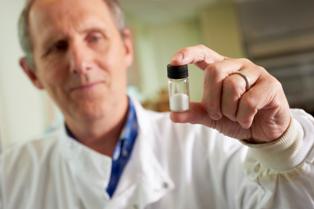New cancer treatment could destroy all types of solid tumour
15 September 2011
A new cancer treatment being developed at the University of Bradford has the potential to find and completely destroy solid tumours, regardless of cancer type.
The drug is inactive until triggered by the heightened activity of an enzyme that is always found in the tumour environment, releasing a potent anti-cancer agent which destroys the tumour’s blood vessels, causing it to starve to death. Moreover, since the enzyme is only usually active at high levels in tumour environments, the drug is unlikely to have any side effects on healthy tissue.
Five different types of cancer have been tested in the laboratory so far — breast, colon, lung, sarcoma and prostate — with no adverse effects observed. In one study, half of the mice showed complete tumour remission after a single dose.
“What we’ve designed is, effectively, a ‘smart bomb’ that can be targeted directly at any solid tumour to kill it without appearing to harm healthy tissue,” says Professor Laurence Patterson, Director of Bradford’s Institute for Cancer Therapeutics (ICT).
The enzyme that triggers the release of the active agent is one of a family of proteases called the Matrix Metalloproteinases (MMPs). Says Professor Patterson: “One role of this particular MMP in cancers is to dig a path for the tumour to grow bigger and develop new blood vessels that will help nourish the tumour. Our novel delivery method uses the presence of this active MMP to activate the drug which attacks and breaks down cancer blood vessels, destroying the tumour’s lifeline.”
The research team believe that the use of MMP activity as a trigger should also enable the new drug to treat secondary tumours caused by the cancer spreading through the body. In addition, they believe that the delivery mechanism could be used to deliver other drugs directly to the tumour site.
The drug’s key active agent is based on colchicine, a natural compound derived from the Autumn crocus — a native British flower described in ancient herbals as a treatment for inflammation. “Although it’s well known for having anti-cancer properties, colchicine is not used to treat cancer because it is too toxic against normal tissues within the body,” says ICT Commercialisation Manager Dr Kevin Adams. “We’ve found a way to harness colchicine’s power so that it's harmless to healthy tissue, but still toxic to tumour blood vessels.”
The team is in discussion with a funder to take the drug through the final stages of preclinical assessment, after which clinical trials are planned to start at St James’s University Hospital in Leeds.
|
|
“We have to remain cautious until we can prove the same remarkable effects in clinical trials,” says Professor Patterson, “but ultimately, if all goes well, we would hope to see this drug used as part of a combination of therapies to treat and manage cancer.”
Morgan Williams, Commercial Development Officer at Yorkshire Cancer Research, said: “Yorkshire Cancer Research is proud to have supported the Institute of Cancer Therapeutics for over a decade. Professor Patterson is the recipient of a flagship Programme Award from Yorkshire Cancer Research to support the discovery and development of new anti-cancer drugs. These drugs take many years to reach the clinic and funding for this kind of drug discovery is a long term investment.
“Many funders have cut the support available to Institutes like the ICT at Bradford leaving it more and more difficult to find support, particularly in the current economic climate. Yorkshire Cancer Research has taken a strategic decision to support work such as this with the potential to deliver patient benefit, and believes that people in Yorkshire will benefit from the local clinical trial planned for this treatment at St James’ University Hospital, which is a nationally recognised centre of excellence.”
